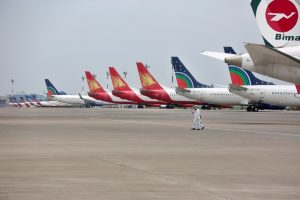Theresa May has vowed to make it as easy as possible for EU citizens to remain in the UK after Brexit ahead of a key summit of European leaders.In a Facebook post, the prime minister insisted the application process for settled status would be “streamlined” and the cost “as low as possible”.
She said representatives of EU citizens will sit on a “user group” which will iron out any problems in the system.
The other 27 EU leaders will assess overall progress in the talks so far.
At a meeting on Friday, at which the UK will not be present, they are expected to conclude officially that “insufficient progress” has been made on the status of EU nationals in the UK and British expats on the continent – and other separation issues – to move onto the second phase of trade discussions.
European Council President Donald Tusk said there would be no “breakthrough” at the two-day summit, but progress could be achieved by the next scheduled meeting of EU leaders in December.
Before leaving for Brussels, Mrs May used her Facebook post to offer further assurances to the three million or so nationals of other EU countries living in the UK and uncertain about their future after Brexit.
In her message, she said those who already had permanent residence would be able to “swap this” for settled status in as hassle-free a way as possible.
Some encouragement for the UK
“I know there is real anxiety about how the agreement will be implemented,” she wrote.
“People are concerned that the process will be complicated and bureaucratic, and will put up hurdles that are difficult to overcome. I want to provide reassurance here too.
“We are developing a streamlined digital process for those applying for settled status in the UK in the future. This process will be designed with users in mind, and we will engage with them every step of the way.”
The process of applying for permanent residency, for which EU nationals are eligible after five years, has long been criticised as cumbersome and overly bureaucratic. At one point, it involved filling out an 85-page form.
‘People first’
In simplifying it, Mrs May said she was committed to putting “people first” in the negotiations and expected British nationals living on the continent to be treated in the same way.
“I know both sides will consider each other’s proposals with an open mind and with flexibility and creativity on both sides, I am confident we can conclude discussions on citizens’ rights in the coming weeks.”
Mrs May, who will address other leaders at a working dinner on Thursday, wants mutual dialogue on the UK’s future relationship with the EU, including trade and defence, to begin as soon as possible.
But Mr Tusk is expected to propose to the 27 EU leaders that they begin talks amongst themselves about Britain’s future relationship with the EU, when it leaves the bloc in March 2019.
As well as citizens’ rights, the two sides remain at odds over the so-called financial “divorce” settlement and the future of the border between Northern Ireland and the Republic.
A group of pro-Brexit Tory and Labour politicians – including former Chancellor Lord Lawson, former Conservative minister Owen Paterson and Labour MP Kate Hoey – is urging Mrs May to walk away from negotiations this week if the EU does not accommodate the UK’s wishes.
A letter to the PM, organised by the Leave Means Leave campaign and also signed by pro-Brexit business figures, says the government “has been more than patient” and “decisive action” is now needed to end the “highly damaging” levels of uncertainty facing businesses.
In the event of no progress at Thursday’s meeting, the letter says, Mrs May should formally declare the UK is working on the assumption it will be reverting to World Trade Organisation (WTO) rules on 30 March 2019.
Early notification of such a move would allow the UK to “concentrate our resources on resolving administrative issues” and prepare to “crystallise the economic opportunities” of Brexit, it adds.
Meanwhile, a trade body for the UK’s creative sector has warned that money generated by it could be hit by a post-Brexit restriction on immigration.
The Creative Industries Federation (CIF) said the £87bn a year that UK-made films, music, adverts and video games generated for the UK economy was at risk if immigration was restricted.
The sector relies heavily on freelance staff, many of whom are from the EU, and the CIF wants the government to negotiate free movement of UK and EU workers for short-term projects. – BBC




